Egyptian Garlic vs. Chinese Garlic: A Comprehensive Comparison for Importers
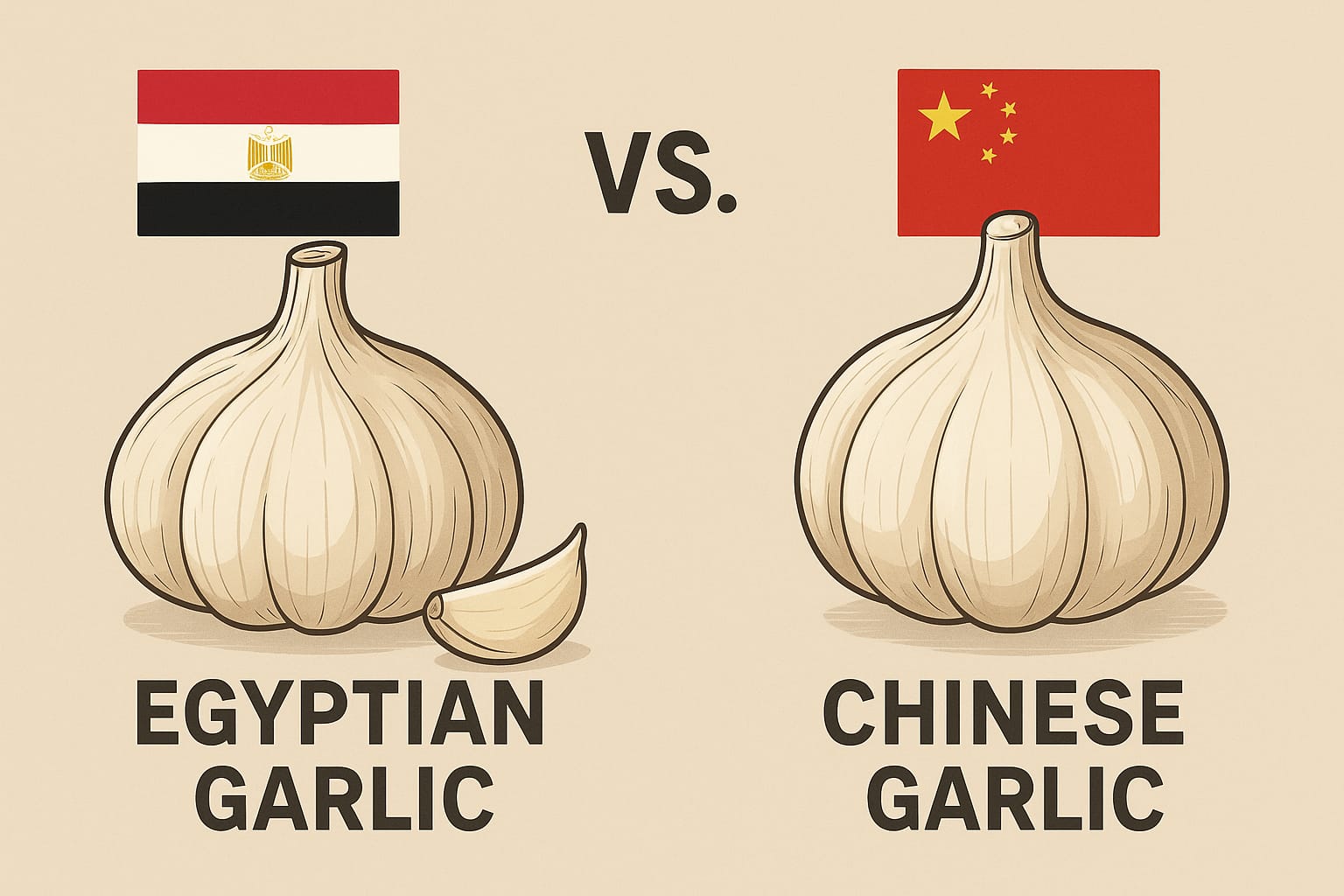
Garlic is one of the most widely used ingredients globally, essential for its unique flavor and health benefits. Among the many varieties available on the market, Egyptian garlic and Chinese garlic are two of the most exported and consumed types worldwide. Despite their similar appearance, these two garlic varieties offer distinct differences in terms of quality, flavor, size, shelf life, and overall appeal to international buyers.
In this detailed comparison, we will explore the key differences between Egyptian garlic and Chinese garlic, discuss their seasonality, and examine the factors that buyers should consider when importing garlic. This article will help importers make an informed decision about which type of garlic best suits their market’s needs.
Seasonality: When is Egyptian Garlic and Chinese Garlic Available?
Understanding the seasonality of garlic is essential for importers looking to plan their shipments efficiently. Garlic is typically harvested in late spring or summer, depending on the region and climate. Below is a comparison of the harvest seasons for Egyptian garlic and Chinese garlic:
| Garlic Type | Harvest Season | Export Window |
|---|---|---|
| Egyptian Garlic | January – July | March – July |
| Chinese Garlic | June – October | July – November |
Egyptian Garlic:
Egyptian garlic has a relatively longer export window compared to Chinese garlic, making it an attractive option for importers looking for a consistent garlic supply. The harvest season for Egyptian garlic typically begins in January and continues through July, with dry garlic available from March to July. The availability of Egyptian garlic extends well into the summer months, ensuring that buyers can maintain a steady supply of high-quality garlic year-round.
Chinese Garlic:
Chinese garlic, on the other hand, has a more limited harvest season, from June to October, with peak availability from July to November. While Chinese garlic is available in large volumes, the shorter export window may leave importers with gaps in supply, especially during the off-season months.
Key Differences: Egyptian Garlic vs. Chinese Garlic
While Egyptian garlic and Chinese garlic may seem similar on the surface, they offer distinct differences in terms of flavor, size, appearance, and storage capabilities. Below, we’ll break down the key differences between the two types of garlic that importers should be aware of.
1. Flavor and Aroma
One of the most significant differences between Egyptian and Chinese garlic is their flavor profile.
-
Egyptian Garlic: Known for its strong, pungent flavor, Egyptian garlic packs a powerful punch in the kitchen. The cloves have a spicy, sharp flavor, making them ideal for recipes where garlic’s robust flavor needs to stand out. Whether raw or cooked, Egyptian garlic imparts a depth of flavor that is a favorite among chefs and home cooks alike.
-
Chinese Garlic: Chinese garlic, on the other hand, tends to have a milder flavor compared to Egyptian garlic. While still aromatic, it lacks the intensity of Egyptian garlic and is often described as sweeter and less pungent. This makes Chinese garlic more suitable for dishes where garlic is used in a supporting role rather than being the star ingredient.
2. Size and Clove Count
-
Egyptian Garlic: Egyptian garlic typically features smaller bulbs with more cloves per bulb. While the smaller size may not be as visually appealing as larger varieties, the extra cloves are an advantage in cooking. They provide more garlic per bulb, which can be especially useful when recipes call for multiple cloves.
-
Chinese Garlic: Chinese garlic is generally known for its larger bulbs and fewer cloves. The larger cloves make it more attractive on the shelf, but the smaller number of cloves per bulb means there’s less garlic per bulb in comparison to Egyptian garlic. This can impact the overall yield and price per bulb.
3. Shelf Life and Storage
-
Egyptian Garlic: One of the standout features of Egyptian garlic is its long shelf life. Due to the dry climate in Egypt and the careful curing process, Egyptian garlic can last up to 6-8 months when stored properly. This makes it a reliable choice for long-distance shipping, ensuring that importers can store the garlic for an extended period without losing quality.
-
Chinese Garlic: Chinese garlic also has a long shelf life, but it’s generally considered to be less resilient than Egyptian garlic in storage. Chinese garlic may degrade faster if not stored in optimal conditions, which can lead to spoilage or deterioration in quality, especially during long shipments.
4. Export and Availability
-
Egyptian Garlic: Egypt is rapidly becoming one of the top exporters of garlic, thanks to its high-quality production, favorable climate, and cost-effectiveness. Egyptian garlic is in high demand across the globe, especially in Europe, the Middle East, and North America. Its consistent quality and reliable supply make it an attractive option for buyers looking for high-quality garlic with predictable shipping schedules.
-
Chinese Garlic: As the world’s largest producer and exporter of garlic, China dominates the global garlic market. However, while Chinese garlic is cost-effective and readily available in large quantities, the quality can sometimes be inconsistent, with fluctuations in garlic size, flavor, and storage conditions. Despite its lower price point, Chinese garlic can sometimes suffer from quality control issues that make Egyptian garlic a more reliable alternative for some markets.
Which Garlic Should You Import?
When deciding between Egyptian and Chinese garlic, importers should consider factors such as flavor, storage, and cost. Here are some key takeaways to help guide your decision:
-
For Strong Flavor and Robust Taste: If your market demands stronger, bolder garlic flavors, Egyptian garlic is the best choice. Its intense aroma and spiciness make it ideal for dishes where garlic is meant to stand out.
-
For Larger Bulbs and Appearance: If aesthetic appeal is important in your market, Chinese garlic might be the preferred option due to its larger bulb size and fewer cloves.
-
For Longer Shelf Life and Consistent Quality: Egyptian garlic offers a longer shelf life and more consistent quality, making it an excellent choice for long-distance shipping and markets that prioritize reliable, high-quality products.
-
For Lower Cost: Chinese garlic is typically more affordable due to the scale of production, making it a suitable option for buyers on a tight budget. However, be prepared for potential quality inconsistencies.
Global Demand for Egyptian Garlic
Egypt’s garlic production has been on the rise, with an increasing number of international buyers recognizing the superior quality of Egyptian garlic. The country’s ability to provide consistent, high-quality garlic with minimal price fluctuations has made it a leading choice for importers worldwide. As demand continues to grow, Egyptian garlic is expected to increase its share of the global market.
Conclusion: Egyptian Garlic vs. Chinese Garlic
In conclusion, while Chinese garlic may dominate in volume and price, Egyptian garlic offers superior flavor, quality, and reliability. For buyers seeking high-quality garlic with a bold flavor and longer shelf life, Egyptian garlic is the optimal choice. Meanwhile, Chinese garlic may be a more affordable option but comes with risks related to quality inconsistencies.
For those interested in learning more about Egyptian garlic and how to import it, be sure to visit our Egyptian Garlic Product Page for more details on our garlic offerings.
Related Articles
Explore
-

Egyptian Garlic vs. Chinese Garlic: A Comprehensive Comparison for Importers
-
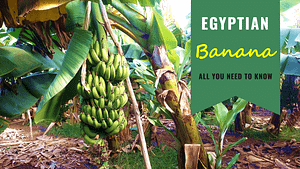
Egyptian Bananas: Top Facts, Importing Guide, and Exporters
-
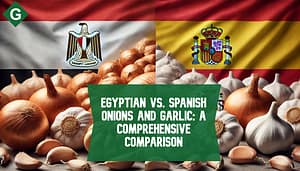
Egyptian vs. Spanish Onions and Garlic: A Comprehensive Comparison
-
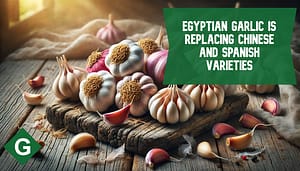
Egyptian Garlic Is Replacing Chinese and Spanish Varieties—Here’s Why
-
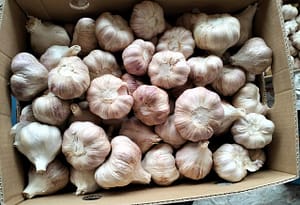
Egyptian Garlic: Premium Quality from Gezira United, Your Trusted Exporter
-
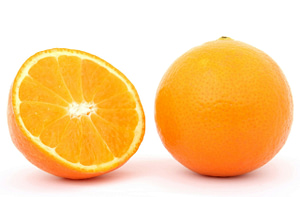
Egyptian Valencia Orange Season Has Just Begun
-
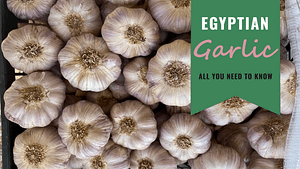
Egyptian garlic: Top Facts, Importing Guide, and Exporters
-
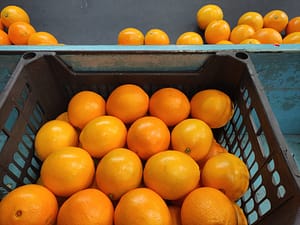
Egyptian Navel Oranges: The Season Has Begun!
-

Gezira United Hosts Global Buyers For A Farm and Packing House Visit
